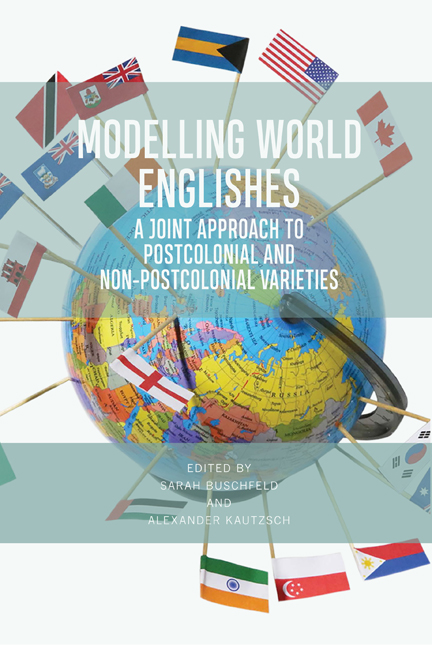Book contents
- Frontmatter
- Contents
- List of Figures and Tables
- List of Contributors
- Foreword
- 1 Introduction
- 2 English in England: The Parent Perspective
- 3 English in Namibia: Multilingualism and Ethnic Variation in the Extra- and Intra-territorial Forces Model
- 4 English in the United Arab Emirates: Status and Functions
- 5 English in India: Global Aspirations, Local Identities at the Grassroots
- 6 English in Singapore: Two Issues for the EIF Model
- 7 English in the Philippines: A Case of Rootedness and Routedness
- 8 English in South Korea: Applying the EIF Model
- 9 English in Japan: The Applicability of the EIF Model
- 10 English in Australia – Extra-territorial Influences
- 11 English in North America: Accounting for its Evolution
- 12 English in The Bahamas and Developmental Models of World Englishes: A Critical Analysis
- 13 Standard English in Trinidad: Multinormativity, Translocality, and Implications for the Dynamic Model and the EIF Model
- 14 Englishes in Tristan da Cunha, St Helena, Bermuda and the Falkland Islands: PCE, non-PCE or both? Blurred Boundaries in the Atlantic
- 15 English in Ireland: Intra-territorial Perspectives on Language Contact
- 16 English in Gibraltar: Applying the EIF Model to English in Non-Postcolonial Overseas Territories
- 17 English in Ghana: Extra- and Intra-territorial Forces in a Developmental Perspective
- 18 Synopsis: Fine-tuning the EIF Model
- Index
4 - English in the United Arab Emirates: Status and Functions
Published online by Cambridge University Press: 24 September 2020
- Frontmatter
- Contents
- List of Figures and Tables
- List of Contributors
- Foreword
- 1 Introduction
- 2 English in England: The Parent Perspective
- 3 English in Namibia: Multilingualism and Ethnic Variation in the Extra- and Intra-territorial Forces Model
- 4 English in the United Arab Emirates: Status and Functions
- 5 English in India: Global Aspirations, Local Identities at the Grassroots
- 6 English in Singapore: Two Issues for the EIF Model
- 7 English in the Philippines: A Case of Rootedness and Routedness
- 8 English in South Korea: Applying the EIF Model
- 9 English in Japan: The Applicability of the EIF Model
- 10 English in Australia – Extra-territorial Influences
- 11 English in North America: Accounting for its Evolution
- 12 English in The Bahamas and Developmental Models of World Englishes: A Critical Analysis
- 13 Standard English in Trinidad: Multinormativity, Translocality, and Implications for the Dynamic Model and the EIF Model
- 14 Englishes in Tristan da Cunha, St Helena, Bermuda and the Falkland Islands: PCE, non-PCE or both? Blurred Boundaries in the Atlantic
- 15 English in Ireland: Intra-territorial Perspectives on Language Contact
- 16 English in Gibraltar: Applying the EIF Model to English in Non-Postcolonial Overseas Territories
- 17 English in Ghana: Extra- and Intra-territorial Forces in a Developmental Perspective
- 18 Synopsis: Fine-tuning the EIF Model
- Index
Summary
INTRODUCTION
The United Arab Emirates (UAE) first gained independence in 1971. Prior to that date, the country used to be a British protectorate dating back to 1820. By the time the country gained independence, the oil industry was on the rise, and the investments enabled by the wealth brought in by the oil changed the country on a massive scale. Expatriates originally came to the UAE to work in the oil industry, but after rapid development in all domains, demand on expatriates was no longer exclusive to the oil sector. Today, expatriates constitute up to 90 per cent of the population. The majority of expats come from South Asian countries. Yet, the Emirates is also home to nationalities from all over the world. Mainly due to the population's highly diverse cultural and linguistic backgrounds, the fact that the UAE is a worldwide-famous tourist attraction and the country's role as a regional trade and media centre, English today plays a major role in most domains from tourism to education and the media.
Due to its diverse linguistic and cultural composition, the UAE has attracted a number of studies investigating the linguistic situation and the role of English in the country (cf. Randall and Samimi 2010). More specifically, a study also applied Schneider's Dynamic Model to English in the UAE and concluded that the variety entered phase 3 of the model (Boyle 2012). The aim of this study is threefold. First, it aims at pointing out the complexity of Emirati history and the difficulties it poses to World Englishes categorisations. Second, it aims at discussing some of the main functions of English in the country. Finally, an attempt will be made to apply the Extra- and Intra-territorial Forces Model (EIF) to the variety.
THE UNITED ARAB EMIRATES – HISTORICAL BACKGROUND
Located in the southeast corner of the Arabian Peninsula, the United Arab Emirates (UAE) borders Saudi Arabia, Oman, the Gulf of Oman and the Persian Gulf. The UAE is a federation of seven emirates, which are Abu Dhabi (the capital), Ajman, Dubai, Fujairah, Ras al-Khaimah, Sharjah and Umm al-Quwain. While the Emirates poses an interesting case for World Englishes research in general, its history is particularly interesting and challenging for the field. Traditionally, the study of emerging varieties of the English language distinguishes between postcolonial Englishes (PCEs) and non-postcolonial Englishes (non-PCEs).
- Type
- Chapter
- Information
- Modelling World EnglishesA Joint Approach to Postcolonial and Non-Postcolonial Varieties, pp. 63 - 84Publisher: Edinburgh University PressPrint publication year: 2020



